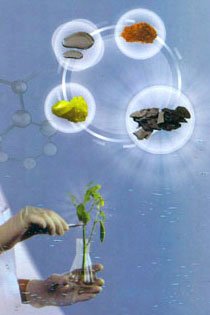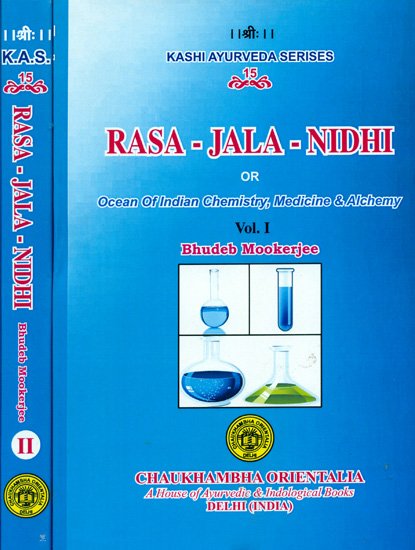Rasa Jala Nidhi, vol 5: Treatment of various afflictions
by Bhudeb Mookerjee | 1938 | 63,627 words | ISBN-10: 8170305829 | ISBN-13: 9788170305828
This fifth volume of the Rasa-jala-nidhi deals with the symptoms, treatment and dietary prescriptions of various afflictions. For example, ratapitta (haemoptysis), cough, asthma, tumours and obesity are dealth with and various Iatro-chemical recipes are provided for these diseases. The Rasa-jala-nidhi (“the ocean of Iatrochemistry, or, chemical me...
Chapter 21 - Symptoms and Treatment of Murcha (loss of consciousness)
Its causes and indications.
Those who are weak in constitution, have a low vitality, have an excess of the three doshas in their systems, and are in the habit of taking food, incongenial by combination (see page 9, vol. IV) are susceptible to this disease. Fits of unconsciousness are preceded by nervous irritation due to suppression of calls of nature and physical shocks, which make the three doshas enter into the seats of sense-organs, internal as well as external. Obstruction of the sense-carrying passages by the three doshas mean total extinction of all sensations, agreeable or disagreeable, which makes the patient appear like an inanimate object. Murcha is of seven different kinds, being due to (a) vayu, (b) pitta, (c) kapha, (d) a combination of these three, (e) smell or sight of blood, (f) drinking of alcohol, and (g) poison. In all these seven, there is a pre-dominance of pitta. An attack of any of these diseases is generally preceded by pain in the heart, yawning, uneasiness, and morbidness of consciousness. They are to be known according to their respective indications, as given below:—
(a) Loss of consciousness due to vayu:
In loss of consciousness due to vayu, the patient gradually loses his consciousness while the sky appears to him to be of blue, or black, or blackish red colour. He regains his consciousness quickly. The other symptoms of this disease are trembling, pain ail over the body, and especially In the heart, emaciation, and blackish red colour of the skin.
(b) Murcha due to an excess of pitta:
In murcha due to an excess of pitta, the patient gradually loses his consciousness while the sky appears to him to be of red or green or yellow colour. He feels thirst, a sensation of heat, and his eyes grow reddish yellow and disturbed. He passes loose stool, bis skin grows yellow, and be regains bis consciousness with perspiration.
(c) Murcha due to an excess of phlegm:
In murcha due to an excess of phlegm, the patient loses his consciousness while the sky appears to be over-cast with cloud or dense darkness. His body appears to be covered with something heavy, such as wet leather. Other symptoms are discharge of saliva and nausea. He regains consciousness after a comparatively long time.
(d) Murcha due to combination of the three doshas:
In murcha due to combination of the three doshas, all the indications stated above may be manifested together. A fit of such a murcha overpowers the patient instantaneously as a fit of epilepsy (apasmara), with this difference, however, that there are in apasmara such physical activities as clattering sound caused by the rubbing of the two sets of teeth together, discharge of foam-like saliva from the mouth, and convulsive movements of the arms and the feet, whereas there are no such activities in murcha due to a combination or the three doshas.
(e) Fainting fits due to the smell or sight of blood:—
The timid and weak are subjected to swoon by the smell or sight of blood. It is from the nature of things that it so happens. The following are the symptoms of such swoons:—inertness of the limbs and eyesights and slowness of respiration.
(f) Fainting fits due to drinking of wine:—
Such fits are due to the vehemence of the properties of wine. The following are the indications of these fits:—ravings, distraction of mind, and rolling on the ground. These symptoms disappear as soon as the wine is digested.
(g) Fainting fits due to poison:—
These are caused by the vehemence of the properties of poison (see page 308, vol. III). The following are the symptoms of such swoons;—trembling, sleeping, thirst, and appearance of darkness. The properties characterising a particular poison appear, much augmented, in a swoon caused by that poison.
Treatment of fainting fits: Simple remedies.
(1) In all sorts of swoons, the following are salutary:—sprinkling of cold water over the face, etc. taking dips in cold water, wearing necklaces made of gold and gems, smearing the body with cold unguents, treating the body with air raised by hand-fans, and cold, cooling, and scented drinks.
(2) Swoon is removed by taking (a) kernel of fruits of badari, maricha, ushira, and nagakeshara, pestled with cold water; or (b) powdered pippali mixed with honey.
(3) Fainting fits and evil effects of drinking wine improperly are pacified by drinking the decoction of shunthi, guduchi, kaptakari, roots of pushkara, and roots of pippali, mixed with powdered pippali.
(4) Murcha is cured by drinking cow’s milk, immediately after milching, unboiled and while it is still warm.
(5) Murcha is pacified by taking one rakti in weight of incinerated copper, mixed with a little of powdered ushira and naga-keshara, all dissolved with cold water.
(6) Murcha is removed by application in both the eyes of a collyrium prepared by rubbing together seeds of shirisha, cow’s urine, pippali, maricha, rock-salt, garlics, manas-shila (realgar), and vacha.
(7) Consciousness is regained by a patient in a state of swoon, if he is made to sniff the following:—essence of madhuka flower, rock-salt, vacha, maricha, and pippali, taken in equal quantities and pestled together very finely.
Intro-chemical remedies in swoon.
Murchantaka rasa.
Equal quantities of rasa-sindura, copper-pyrites, gold, shila-jatu, and iron are to be rubbed together and subjected to bhavana with the juice of shatavari and vidari. Pills are then to be made, three raktis in weight, each. This medicine cures swoon.
Kana rasa.
Incinerated mercury, mixed with honey and pippali, cures murcha. Pouring of cold water on the head and abrupt torture are also to be adopted.
Deeds and diet salutary in murcha:—
Sprinkling and pouring of water on the head and the face, taking dips in cold water, wearing necklaces made of gold and gems, smearing the body with cold unguents, treating the patient with breeze raised by hand-fans; cold, cooling and perfumed drinks; resorting to rooms cooled with water-spray issuing out of artificial founts, enjoying the rays of the moon, inhaling (smokes of jatamansi, etc.), collyrium, snuff, letting ont of blood, burning some parts of the body, pricking the skin by means of needles, drawing by the hair, tortures caused inside the nails, biting the skin of the patient, stopping inhaling of air by closing the month and the nostrils, purgation, vomiting, fasting, anger, fear, lying on discomfortable bed, hearing of strange and amusing speeches, living in shaded places, exposure to rain, rubbing the head with clarified butter, rubbed with water for hundred times; soft food, bitters, paste prepared from paddy fried and divested, of husks, barley and rice of red shali, as old as procurable, clarified butter of mere than ten years’ standing, soup of mudga and kalaya, soup of meat of game-fowl, raga, sharaba (see page 117), cow’s, milk, sugar, kushmanda fruit of long standing, patola, banana, haritaki, pomegranates, cocoanut, madhuka flower, such potherbs as tanduliya, upodika, light food, good water, smearing the body with white sandal-paste, drinking of water perfumed with camphor, inhaling of camphor, hearing of loud sound, seeing of strange sights; hearing of music, vocal, instrumental, and grotesque in character, physical exercise, exercise of memory, contemplation, knowledge of the soul, and patience.
Articles of food-stuff and deeds injurious in murcha:—
Betel leaves, pot-herbs, rubbing the teeth for cleansing, exposure to the sun’s rays, food and drinks incongenial by combination; sexual intercourse, fomentation, pungents, suppression of thirst and sleep, and butter-milk.
Conclusion:
 This concludes ‘Symptoms and Treatment of Murcha (loss of consciousness)’ included in Bhudeb Mookerjee Rasa Jala Nidhi, vol 5: Initiation, Mercury and Laboratory. The text includes treatments, recipes and remedies and is categorised as Rasa Shastra: an important branch of Ayurveda that specialises in medicinal/ herbal chemistry, alchemy and mineralogy, for the purpose of prolonging and preserving life.
This concludes ‘Symptoms and Treatment of Murcha (loss of consciousness)’ included in Bhudeb Mookerjee Rasa Jala Nidhi, vol 5: Initiation, Mercury and Laboratory. The text includes treatments, recipes and remedies and is categorised as Rasa Shastra: an important branch of Ayurveda that specialises in medicinal/ herbal chemistry, alchemy and mineralogy, for the purpose of prolonging and preserving life.
